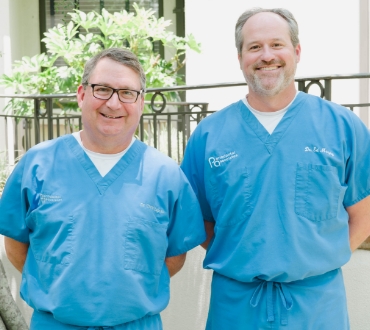-
What are the consequences of missing teeth?
There are actually several negative consequences of missing some or all of your teeth. First, missing teeth will affect the esthetics of your face. Not only will your smile be affected by the gaps from missing teeth, but if you’re missing too many teeth, the skin around your mouth won’t be supported properly and will start to sag, making your appear older than you are. Additionally, missing teeth will make it more difficult to chew your food properly and may even affect the way you speak. Finally, missing even one tooth may have emotional consequences; many people feel less confident about their smile when they are missing teeth. If you are currently missing any of your teeth, consider replacing them with dental implants, which can look and feel just like natural teeth. For more information about implants, browse www.perio.org or talk to your periodontist.
-
I have big gums and short teeth, so when I smile you can almost only see my gums. I don’t smile very often anymore because I am so self conscious of my gums. Is there a way to improve my smile?
Yes, there may be a way to enhance your smile. It’s a good idea to discuss your options with a periodontist first. He or she can explain the best way to create the smile you want, as well as answer any questions that you may have. For example, one procedure that can remove excess gum tissue is called crown lengthening. After the excess gum tissue is removed, the gum line is then reshaped in order to create the right proportion between gum tissue and tooth surface. Your general dentist and periodontist may also work together to coordinate additional treatments such as veneers or crowns. However, your periodontist and general dentist will recommend the best procedure to improve your smile.
-
Is periodontal disease contagious?
Research has shown that periodontal disease is caused by the inflammatory reaction to bacteria under the gums, so periodontal disease technically may not be contagious. However, the bacteria that cause the inflammatory reaction can be spread through saliva. This means that if one of your family members has periodontal disease, it’s a good idea to avoid contact with their saliva by not sharing eating utensils or oral health equipment. If you notice that your spouse or a family member has the warning signs of a possible periodontal problem (bleeding, red and swollen gums, or bad breath) you may want to suggest that they see the periodontist for an exam. It may help to protect the oral health of everyone in the family.
-
I was recently diagnosed with periodontal disease. How often should I see my periodontist for an examination?
Regular examinations are very important to keep track of the present status of your disease and any disease progression over time. Your periodontist will work with you to create a maintenance schedule depending on how advanced your periodontal disease is at that time. Based on many variable factors such as your overall health, the severity of bone loss, and risk factors such as smoking and genetics, your periodontist will constantly tailor your care so your periodontal disease does not progress further. He or she may recommend exams every six months for mild periodontal disease, or every few months for more advanced stages.
-
Who should treat my periodontal disease: my general dentist or a periodontist?
Instead of leaving your treatment to one dental professional, you should consider having both your general dentist and a periodontist be actively involved in the diagnosis and treatment of your periodontal disease. This team approach will help your general dentist (who is familiar with your dental and medical history) and your periodontist (who has extensive experience treating periodontal disease) collaborate to tailor a treatment plan that works best for your individual case.
-
My periodontist says that he is “board certified.” What does that mean?
All periodontists must complete an additional two to three years of specialized training in periodontics following dental school. However, some periodontists opt to take the board-certification examination, which is offered by the American Board of Periodontology once per year. Board certification in periodontology denotes someone who has made significant achievements beyond the mandatory educational requirements of the specialty, including demonstrating a comprehensive mastery of all phases of periodontal disease and treatment and in the placement of dental implants. Recertification is required every six years.










